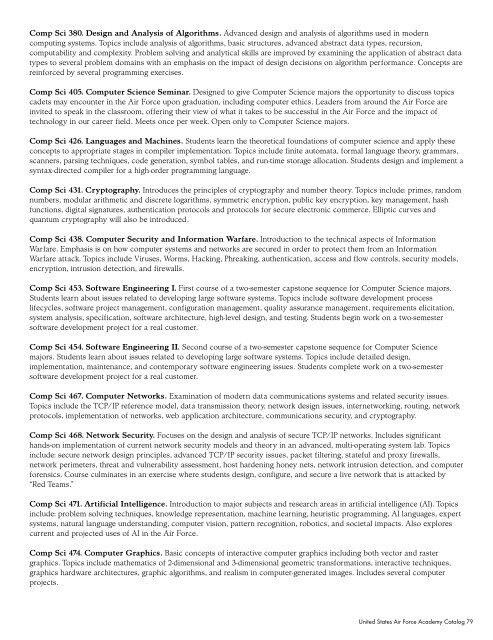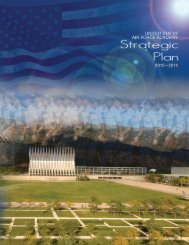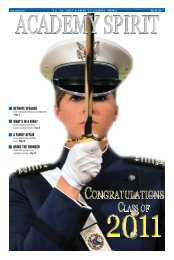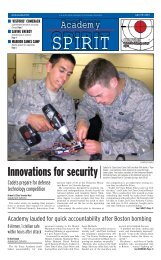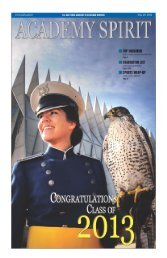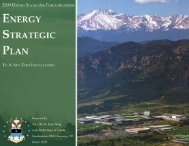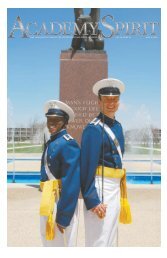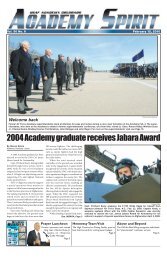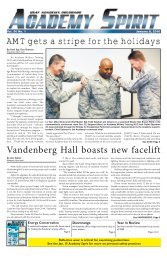2008-2009 Catalog - United States Air Force Academy
2008-2009 Catalog - United States Air Force Academy
2008-2009 Catalog - United States Air Force Academy
You also want an ePaper? Increase the reach of your titles
YUMPU automatically turns print PDFs into web optimized ePapers that Google loves.
Comp Sci 380. Design and Analysis of Algorithms. Advanced design and analysis of algorithms used in modern<br />
computing systems. Topics include analysis of algorithms, basic structures, advanced abstract data types, recursion,<br />
computability and complexity. Problem solving and analytical skills are improved by examining the application of abstract data<br />
types to several problem domains with an emphasis on the impact of design decisions on algorithm performance. Concepts are<br />
reinforced by several programming exercises.<br />
Comp Sci 405. Computer Science Seminar. Designed to give Computer Science majors the opportunity to discuss topics<br />
cadets may encounter in the <strong>Air</strong> <strong>Force</strong> upon graduation, including computer ethics. Leaders from around the <strong>Air</strong> <strong>Force</strong> are<br />
invited to speak in the classroom, offering their view of what it takes to be successful in the <strong>Air</strong> <strong>Force</strong> and the impact of<br />
technology in our career field. Meets once per week. Open only to Computer Science majors.<br />
Comp Sci 426. Languages and Machines. Students learn the theoretical foundations of computer science and apply these<br />
concepts to appropriate stages in compiler implementation. Topics include finite automata, formal language theory, grammars,<br />
scanners, parsing techniques, code generation, symbol tables, and run-time storage allocation. Students design and implement a<br />
syntax-directed compiler for a high-order programming language.<br />
Comp Sci 431. Cryptography. Introduces the principles of cryptography and number theory. Topics include: primes, random<br />
numbers, modular arithmetic and discrete logarithms, symmetric encryption, public key encryption, key management, hash<br />
functions, digital signatures, authentication protocols and protocols for secure electronic commerce. Elliptic curves and<br />
quantum cryptography will also be introduced.<br />
Comp Sci 438. Computer Security and Information Warfare. Introduction to the technical aspects of Information<br />
Warfare. Emphasis is on how computer systems and networks are secured in order to protect them from an Information<br />
Warfare attack. Topics include Viruses, Worms, Hacking, Phreaking, authentication, access and flow controls, security models,<br />
encryption, intrusion detection, and firewalls.<br />
Comp Sci 453. Software Engineering I. First course of a two-semester capstone sequence for Computer Science majors.<br />
Students learn about issues related to developing large software systems. Topics include software development process<br />
lifecycles, software project management, configuration management, quality assurance management, requirements elicitation,<br />
system analysis, specification, software architecture, high-level design, and testing. Students begin work on a two-semester<br />
software development project for a real customer.<br />
Comp Sci 454. Software Engineering II. Second course of a two-semester capstone sequence for Computer Science<br />
majors. Students learn about issues related to developing large software systems. Topics include detailed design,<br />
implementation, maintenance, and contemporary software engineering issues. Students complete work on a two-semester<br />
software development project for a real customer.<br />
Comp Sci 467. Computer Networks. Examination of modern data communications systems and related security issues.<br />
Topics include the TCP/IP reference model, data transmission theory, network design issues, internetworking, routing, network<br />
protocols, implementation of networks, web application architecture, communications security, and cryptography.<br />
Comp Sci 468. Network Security. Focuses on the design and analysis of secure TCP/IP networks. Includes significant<br />
hands-on implementation of current network security models and theory in an advanced, multi-operating system lab. Topics<br />
include: secure network design principles, advanced TCP/IP security issues, packet filtering, stateful and proxy firewalls,<br />
network perimeters, threat and vulnerability assessment, host hardening honey nets, network intrusion detection, and computer<br />
forensics. Course culminates in an exercise where students design, configure, and secure a live network that is attacked by<br />
“Red Teams.”<br />
Comp Sci 471. Artificial Intelligence. Introduction to major subjects and research areas in artificial intelligence (AI). Topics<br />
include: problem solving techniques, knowledge representation, machine learning, heuristic programming, AI languages, expert<br />
systems, natural language understanding, computer vision, pattern recognition, robotics, and societal impacts. Also explores<br />
current and projected uses of AI in the <strong>Air</strong> <strong>Force</strong>.<br />
Comp Sci 474. Computer Graphics. Basic concepts of interactive computer graphics including both vector and raster<br />
graphics. Topics include mathematics of 2-dimensional and 3-dimensional geometric transformations, interactive techniques,<br />
graphics hardware architectures, graphic algorithms, and realism in computer-generated images. Includes several computer<br />
projects.<br />
<strong>United</strong> <strong>States</strong> <strong>Air</strong> <strong>Force</strong> <strong>Academy</strong> <strong>Catalog</strong> 79


